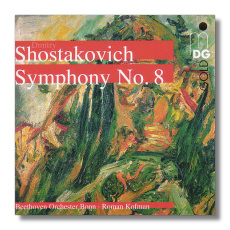
The Internet's Premier Classical Music Source
Related Links
- Shostakovich Reviews
- Latest Reviews
- More Reviews
-
By Composer
-
Collections
DVD & Blu-ray
Books
Concert Reviews
Articles/Interviews
Software
Audio
Search Amazon
Recommended Links
Site News
 CD Review
CD Review
Dmitri Shostakovich

Symphony #8 in C minor, Op. 65
Beethoven Orchestra Bonn/Roman Kofman
Dabringhaus & Grimm MDG3771204-2 71m DDD
Shostakovich's Eighth is the second symphony of a group of three in what is considered to be the composer's 'War Trilogy'. Composed and premièred in 1943, this work of pain, hope and triumph had a turbulent beginning. Shunned by most critics and audiences alike, it was misunderstood and underrated, maybe due to the sensational success of the Seventh two years earlier. For the next three or so years, this piece could still not shake off this initial aversion, until the Prague Spring Festival of 1947 when Yevgeny Mravinsky conducted it for a second time. The reaction at the end of this performance was sensational and deeply moving, the ovations lasting for over 30 minutes.
The following year, the symphony was the main target of derision by the Soviet authorities and it was only in the late 1950's that this masterpiece managed to establish a permanent foothold in the world's concert halls. The language of the Eighth is one of human suffering and endurance in the wake of the ravages of war, a struggle of the human spirit against the madness of evil which threatens to destroy all that is good, but which is finally overcome by an indomitable strength of survival. Its structure is also unique in the sense that the first movement can be described as 'a symphony within a symphony' – its duration lasts for just over 30 minutes and is as long as almost the other four movements put together.
This is a symphony of extreme dramatic content and vastly conflicting human emotions brilliantly executed by the Beethoven Orchestra, Bonn, an ensemble not best suited, one might think to such repertoire but whose unflinching loyalty to the composer's thoughts and aspirations is amply displayed in this version of towering grandeur and sorrowful nobility. The Ukrainian conductor, Roman Kofman is no less immersed in this cauldron of man's inhumanity to man, wrenching out every shriek and groan encapsulated in the score. His direction is inspiring, passionate and very often, apocalyptic with the last pages in particular, convincingly done.
Turning darkness into light is never an easy thing to do, but Kofman manages this transformation with such a self-belief that its impact will linger on for quite a while. This fourth MD&G volume dedicated to the Shostakovich cycle is as memorable as the previous three and judging from what has been achieved so far, the complete set will definitely rank among the best Shostakovich cycles recorded in recent years.
Copyright © 2005, Gerald Fenech




















